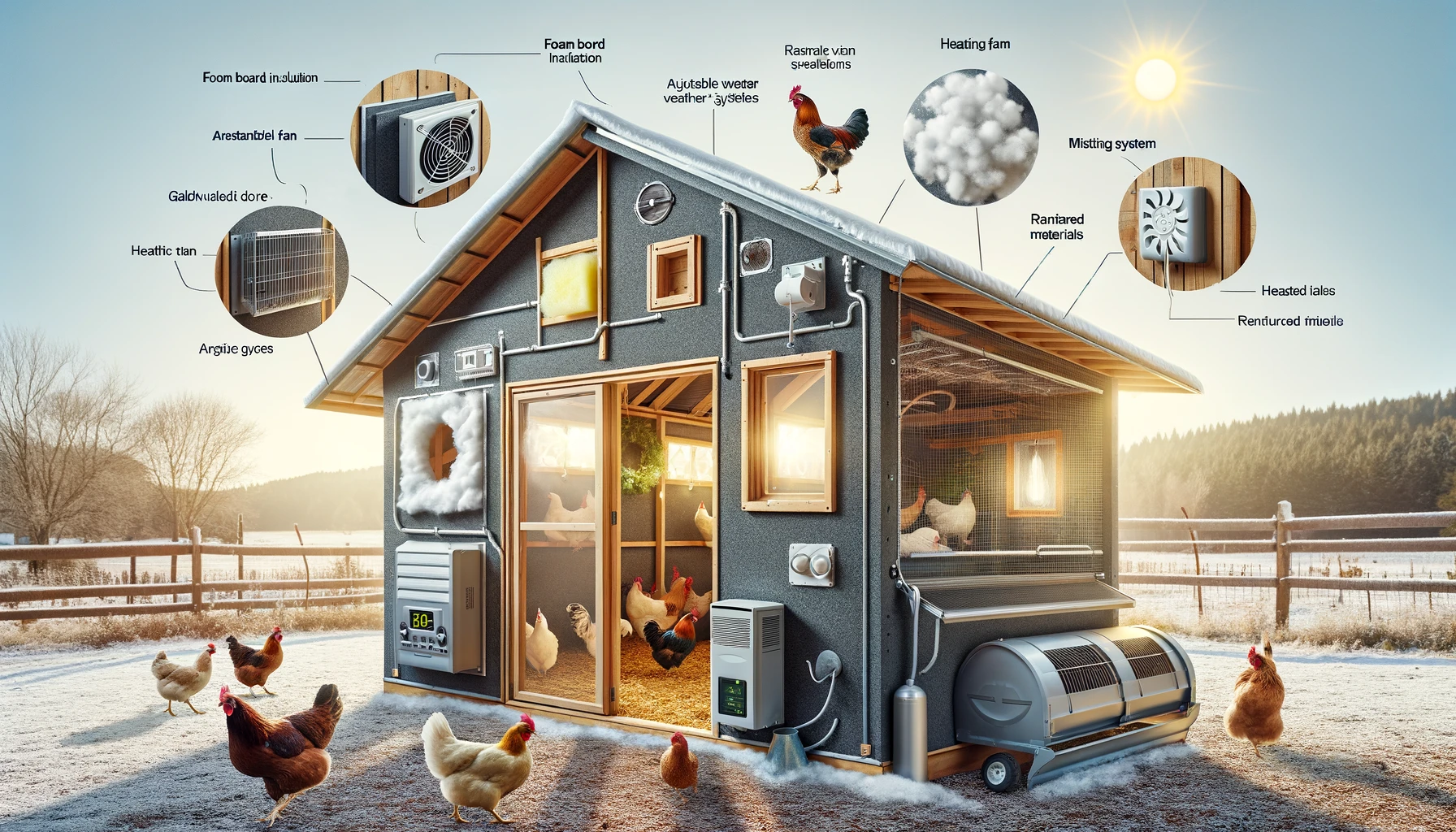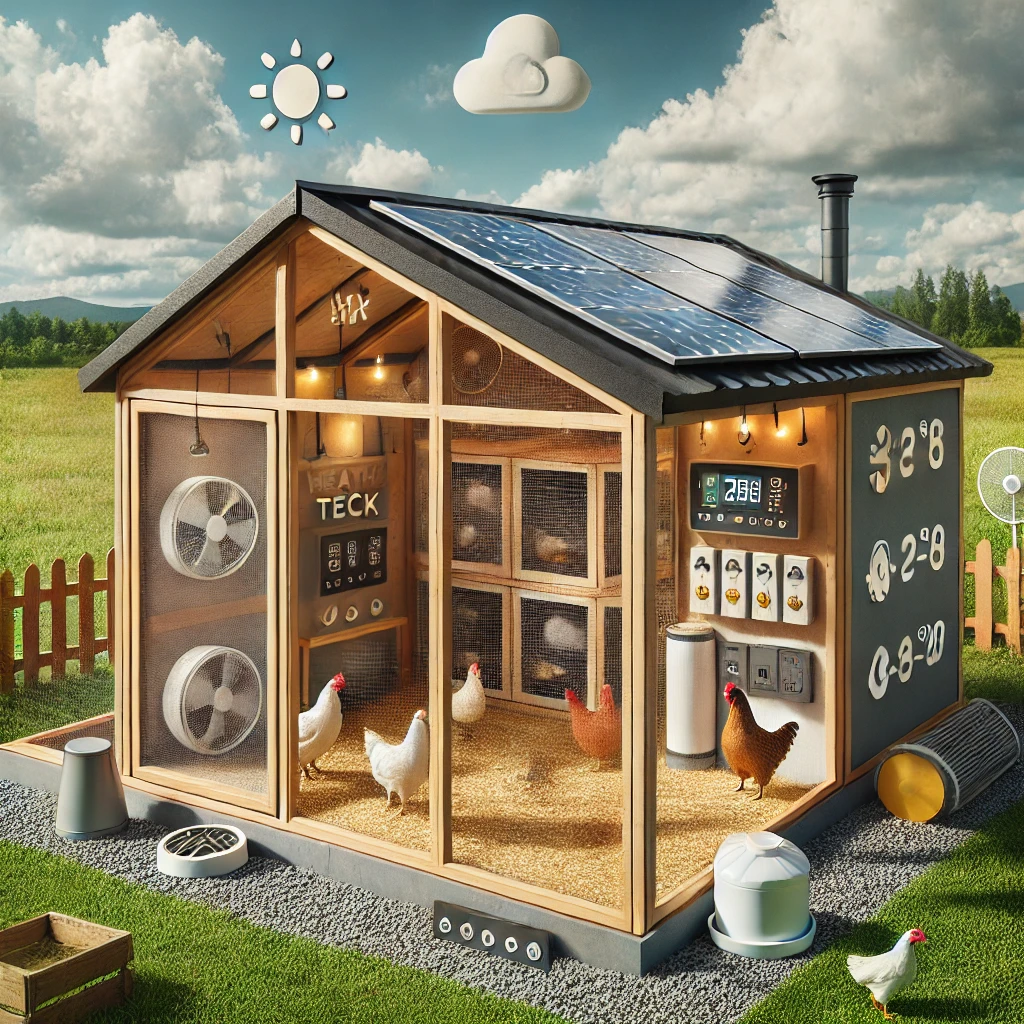- December 25, 2024
Weather Tech for Chicken Coop

Weather Tech for Chicken Coop: How to Keep Your Chickens Safe and Comfortable Year-Round
Raising chickens can be a rewarding experience, but it also comes with the responsibility of keeping them safe and comfortable, regardless of the weather. One of the most important aspects of chicken care is ensuring that your coop is equipped with the right weather technology to protect your birds from extreme temperatures, storms, and moisture. In this article, we’ll explore various “weather tech for chicken coop” solutions that can help you maintain a safe, healthy environment for your chickens throughout the year.

Insulation Methods for Chicken Coops
Proper insulation is one of the most effective ways to regulate the temperature inside your chicken coop. During the colder months, insulation helps keep the coop warm, while in the summer, it can prevent the interior from becoming too hot. Common insulation materials include foam boards, fiberglass, straw bales, and reflective insulation. When installing insulation, focus on the roof, walls, and floor to ensure that heat stays inside during winter and is blocked out during summer.
Tip: If you’re using straw or hay for insulation, remember to replace it regularly to avoid dampness, which can lead to mold or health issues for your chickens.
Proper Ventilation in Chicken Coops
While insulation helps control the temperature, proper ventilation is just as important to maintain a healthy atmosphere in your chicken coop. Poor ventilation can lead to the buildup of harmful gases like ammonia and excessive moisture, both of which can harm your chickens’ respiratory system.
The best ventilation systems include windows, vents, and fans that allow fresh air to circulate without letting in drafts or compromising the temperature. Ensure your coop has adjustable vents that can be opened or closed depending on the weather conditions.
Weatherproofing Your Chicken Coop
A weatherproof chicken coop is essential to protect your chickens from rain, snow, and high winds. Use durable materials like treated wood or galvanized metal for the walls and roof, which are designed to resist water damage. You should also ensure the roof has a slight slope to allow rainwater to run off easily.
When weatherproofing, pay special attention to the doors and windows. Use weather strips to seal gaps and prevent drafts. You may also want to install a drip edge on the roof to prevent water from running down the walls.
Heating Solutions for Cold Weather
When temperatures dip, chickens need extra warmth, especially at night. While chickens are hardy and can tolerate some cold, extreme temperatures can lead to frostbite and other health issues.
Safe heating solutions include radiant heaters, heat lamps (safely mounted to avoid fire hazards), or heated pads that can be placed inside the coop. Be sure to monitor the temperature and provide enough space for your chickens to avoid overheating, which can cause stress.
Cooling Techniques for Hot Weather
On the flip side, summer heat can be just as challenging for your chickens. Chickens are susceptible to heat stress, which can lead to dehydration and even death in extreme cases. To keep your chickens cool, consider installing fans, misting systems, or shade cloths to provide a cooler environment inside the coop.
Ensure your chickens always have access to fresh, cool water. You can use waterers that are designed to prevent the water from getting too warm or use ice cubes to help keep it cool during the hottest days.
Storm-Proofing Chicken Coops
In regions prone to storms, it’s important to make sure your chicken coop is secure and resilient against strong winds, heavy rain, and potential flooding. Use sturdy materials like steel or pressure-treated wood to reinforce the structure. Ensure that doors and windows are securely latched, and check for weak spots in the roofing or foundation that could let in water or wind.
If you live in an area that experiences frequent storms, consider elevating the coop slightly to prevent flooding from heavy rains.
Temperature Monitoring and Control in Chicken Coops
One of the most effective ways to ensure that your chickens are comfortable is by monitoring the temperature inside the coop. Digital thermometers or smart temperature sensors can give you real-time updates on the coop’s conditions, allowing you to make adjustments as necessary.
Many temperature control systems can be automated, allowing you to set the ideal temperature range for your chickens, ensuring they stay comfortable without manual adjustments.
Predator Protection During Inclement Weather
Inclement weather often causes predators to become more active, seeking shelter and food. It’s important to reinforce your coop’s security to prevent predators from getting inside, especially during storms. Use sturdy fencing, reinforced doors, and locks to keep predators out.
Consider adding motion-sensor lights or cameras to monitor the area around your coop during stormy weather when predators are more likely to approach.
Managing Humidity and Moisture Control
Excess moisture can be a breeding ground for bacteria, mold, and mildew, which can harm your chickens’ health. It’s essential to keep your coop dry and well-ventilated to manage humidity. Regularly clean the bedding and ensure the coop is dry, especially during rainy seasons or after snowmelt.
For additional moisture control, you can use desiccants like diatomaceous earth to absorb excess moisture or install moisture-removal fans to keep the air fresh.
Sustainable and Eco-Friendly Weather Protection
For those looking to make their chicken coop more environmentally friendly, there are several ways to integrate sustainable weather tech solutions. Solar-powered fans or lights can help maintain a comfortable environment inside the coop while reducing energy consumption. Additionally, using natural materials such as straw or bamboo for insulation, and setting up rainwater collection systems to water your chickens, can help reduce your ecological footprint.
By choosing sustainable options, you not only help the environment but also create a healthier, more efficient space for your chickens.
Conclusion
Incorporating weather tech for your chicken coop is essential to ensure the health and well-being of your chickens throughout the year. From insulation and ventilation to temperature control and predator protection, there are a variety of strategies and technologies you can use to keep your chickens safe and comfortable in any weather condition. By paying attention to these details, you’ll create a more resilient and efficient chicken coop that works for both you and your chickens, no matter the season.